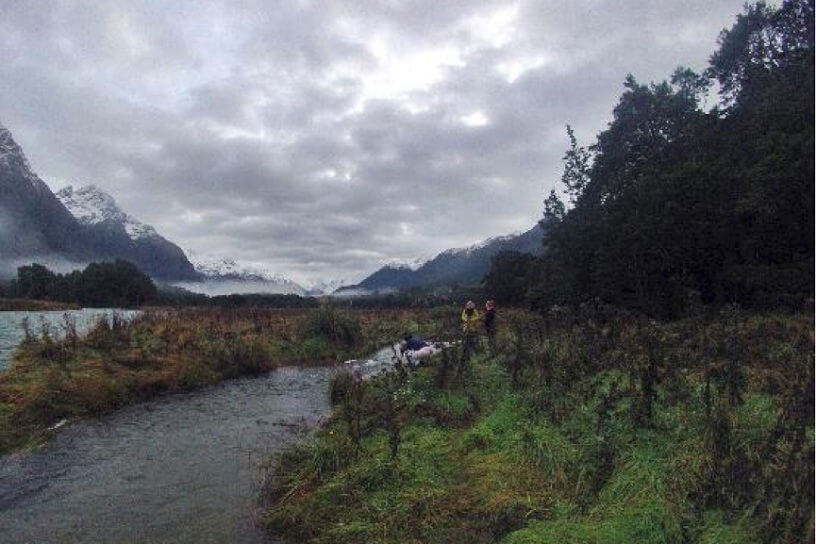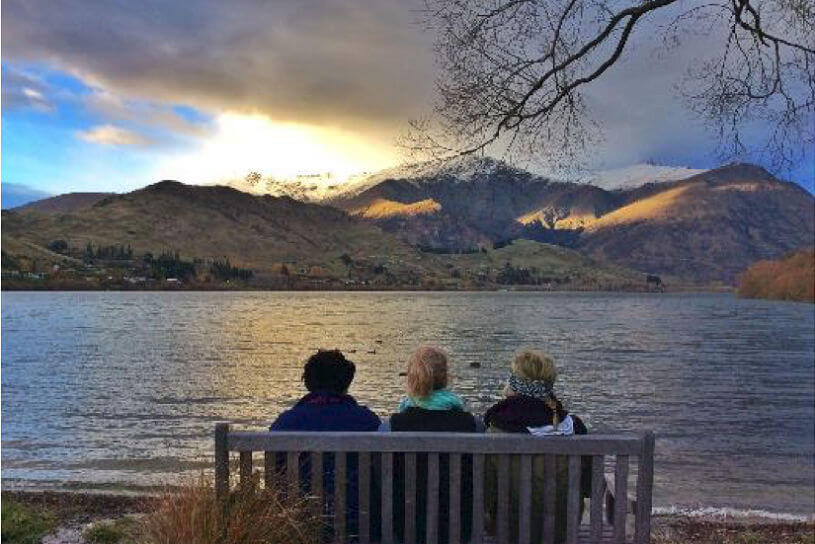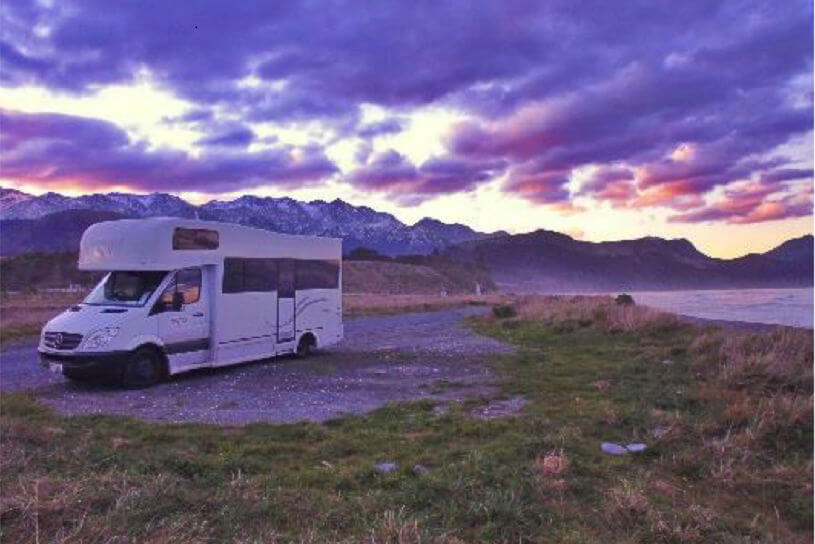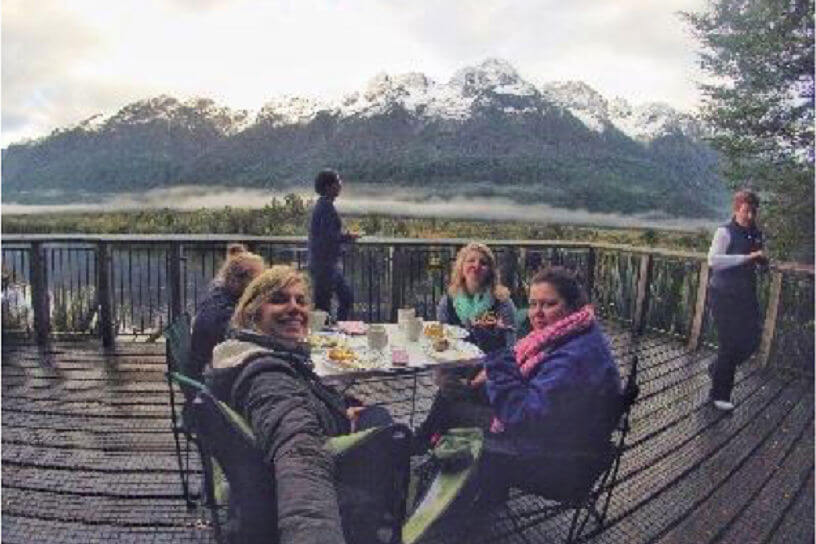Camping sites like you’ve never seen before
'Freedom camping'. These two little words are what make New Zealand the ultimate destination for a road trip. There are over 340 freedom camping spots scattered around New Zealand and not only are they budget friendly but they also are usually in the most scenic and often remote locations.
When my three best friends and I rented a campervan for a 12-day roadie around New Zealand, we planned on free camping as much as we could. While every camping spot was memorable in one way or another, these are my four favourites and I’m only too willing to share these incredible places.
Deer Flat
It was our first night freedom camping. We pulled up here just on dark after an incredible day. We’d driven south from Te Anau, literally straight into the snow and took a cruise through the glory that is Milford Sound. Deer Flat was merely a picnic area with a drop dunny and a picnic table, but what surrounded Deer Flat was oh-so much more. The snow peaked mountains glowed under the darkening sky and a fast moving river was just a few steps away. Sucking in the fresh glacial air, it was hard not to feel alive.
Despite being tired from the days adventure, the cool air and surroundings made me want to do cartwheels!
We woke early in the morning, not waiting for the sun to have a better look around. Washing the sleep from my eyes with the icy water from the river, it was hard to comprehend our little camping ground. How someone would trade getting back to nature to stay in a fancy hotel is beyond me. We were living in a postcard, with a 360-degree view all to ourselves.

Lake Hayes
The thing about New Zealand is that you can get a little blasé about the scenery. Everywhere you look is a breathtaking sight. We were about five days into our road trip and the snowy-capped mountains against the clear blue sky were becoming the norm for us. It wasn’t until we parked up at Lake Hayes, just fifteen minutes out of Queenstown, that the incredible view took our breath away again.
We arrived just on dusk at the free camping spot at Lake Hayes. There was only one other camper there right by the lake so we felt like we had the entire place to ourselves.
The sun was just washing its last rays of gold through the sky as we unpacked the van.
It created the most magical view, with the snowy mountains glistening in the reflection of the lake.
A flock of geese were by the water’s edge, scrounging around for some dinner.
We quickly pulled out of camp chairs and table and set them up by the geese. Having gone grocery shopping earlier while hungry, we now had a van full of wine and cheese. Making a plate of nibbles (ahem, I mean three plates) we perched up at the water’s edge to watch the sun go down.
It was so calm and quiet as the view in front of us had rendered us speechless – a mean feat for four chatty girls – and grateful for the adventure we were on together.

Hapuku
We were at the end of our trip by this time and this freedom camping business was becoming a way of life for us. Just 15km north of Kaikoura we found a spot at Hapuku.
Looking one way, we had water front accommodation by the beach, face the other direction and we had those beautiful snow capped mountains standing grandly in front of us. It was the most unique twist of nature I’d ever witnessed.
It was blowing a gale at Hapuku but that didn’t stop us from sitting out in the strong wind to watch the sun settle below the horizon.
It had become our little tradition, watching the sun set with a glass of wine in hand, laughing and enjoying a beautiful surrounding - a little tradition that we intended to keep, even long after we left Kiwi soil.

New World Supermarket
There might have been no snowy mountains, pristine lakes or postcard perfect sunsets, but camping in the car park of the local supermarket in Nelson was one of our most memorable nights of the trip. Plus, we had free wifi!

Who can freedom camp?
If you are travelling in a fully-contained campervan or motorhome (namely a vehicle with a toilet, wastewater tank and rubbish facilities onboard) then you are allowed to camp overnight for free on public land throughout the Queenstown region. Just keep an eye out for a signpost stating otherwise, and if they are in the area, be sure to read the sign carefully and adjust your camping spot accordingly.
In return for the free camping sites, the Queenstown government requests that you:
- Camp away from the region’s town centres and residential areas.
- Dispose of your wastewater at any of the regional motorhome dump stations
- Only dispose of your rubbish in the bins provided within town centres or at the Council transfer stations
- Do not light any fires
- Leave the area just as you found it—sans litter or damage.
- Stay a maximum of two nights
Freedom camping without a self-contained campervan will result in a $200 instant fine.
Things you should know:
- We found all our freedom camping spots using the Jucy app.
- When freedom camping you are fully responsible for getting ride of your waste.
- The clever guys at Jucy have put together an interactive map that shows you all the freedom camping sites, as well as regular campsites and dump stations.
- Common sense prevails when free camping. Clean up after yourself and always respect your surroundings.
- When freedom camping you probably won’t get showers or electricity, but you’ll always get adventure and a good story!
- CamperMate is another great app to help you get locations of public toilets, rubbish bins, campsites, free wifi, supermarkets and much more.
Jess Buchan is an Australian travel blogger who has lived in Europe and loves to share her travel stories on her blog A Blonde and Her Passport.
Instagram: @ablondeandherpassport and Twitter: @ablondeandher
The views, opinions and positions expressed by the author and those providing comments are theirs alone, and are meant as travel inspiration only. They do not reflect the opinions of Cover-More Insurance. You should always read the PDS available from your travel insurance provider to understand the limits, exclusions and conditions of your policy and to ensure any activities you undertake are covered by your policy.